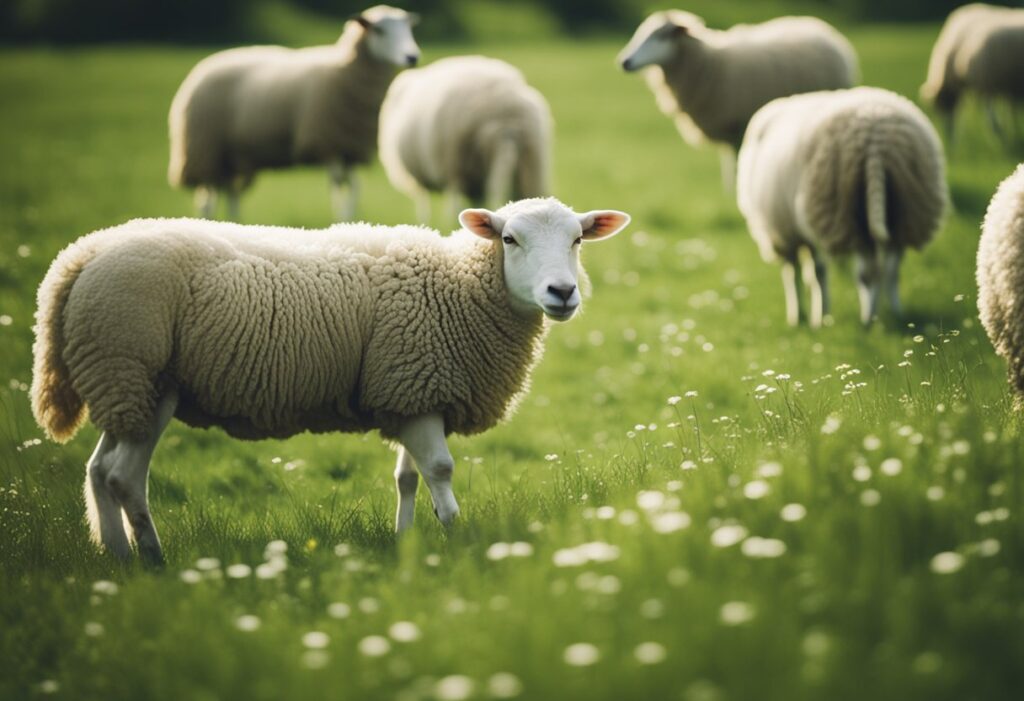Have you ever wondered about the spiritual meaning of sheep? These gentle creatures have played a significant role in various cultures, religions, and mythologies throughout history.
Sheep symbolism is rich and diverse, representing everything from purity and innocence to sacrifice and obedience.
In this article, we’ll explore the spiritual significance of sheep and what they can teach us about ourselves and the world around us.
Let’s dive in!
Key Takeaways
- Sheep have played a significant role in various cultures, religions, and mythologies throughout history.
- Sheep are often associated with purity, innocence, sacrifice, and abundance.
- Sheep symbolism teaches us about gentleness, peacefulness, fertility, and divine blessings.
Table of Contents
Sheep in Spiritual Symbolism
For centuries, sheep have been used as a symbol of innocence and purity in spiritual contexts. In this section, we’ll explore how sheep have been used in spiritual symbolism, including their association with the Lamb of God, their role in Christian imagery, and their meaning in dreams.
Sheep as a Symbol of Innocence and Purity
Sheep have long been associated with qualities such as innocence and purity. In many cultures, sheep are seen as gentle and peaceful creatures, embodying the qualities we aspire to cultivate.
In Hinduism, for example, sheep symbolize abundance and fertility, representing the divine blessings that flow through all aspects of life.
The Lamb of God and Christian Imagery
In Christianity, sheep are often associated with the Lamb of God, a title given to Jesus Christ. This association is based on the idea that Jesus was sacrificed like a lamb to atone for humanity’s sins.
As a result, sheep have become a powerful symbol of sacrifice and redemption in Christian imagery.
Sheep in Dreams and Their Interpretations
Sheep can also have powerful meanings in dreams. Seeing a sheep in a dream can be interpreted as a sign of purity, innocence, or spiritual growth.
Alternatively, it may indicate a need for guidance or a desire to belong to a group. If you dream of a flock of sheep, this may signify abundance and prosperity in your life.
In summary, sheep have been used as a symbol of innocence and purity in spiritual contexts for centuries. Whether in Christian imagery or dreams, sheep have powerful meanings that can help us understand our spiritual journeys.
Related post: The Spiritual Meaning Of Dead Pigeon.
Cultural and Mythological Significance

Sheep have held a special place in many cultures and mythologies, offering several meanings. Let’s explore some of their cultural and mythological significance.
Sheep in Ancient Religions and Mythologies
In ancient religions and mythologies, sheep were often associated with gods and goddesses. In Celtic mythology, for example, the ram was considered a symbol of Cernunnos, the god of fertility, life, and animals.
In Greek mythology, the god Zeus was said to have been raised by a nymph and a goat. In some versions of the myth, the goat was later replaced by a sheep.
Sheep were also used as sacrificial animals in many ancient religions. In Judaism, for example, sheep were often used as offerings to God. In Islam, sheep are still used as sacrificial animals during the festival of Eid al-Adha.
Black Sheep and White Sheep: Cultural Connotations
Black sheep and white sheep have different cultural connotations. In many cultures, black sheep are associated with bad luck or misfortune. This is thought to have originated from black wool being less valuable than white wool, making black sheep less desirable.
In contrast, white sheep are often associated with purity and innocence. In Christianity, for example, the sheep is often used to symbolize the faithful, guided by Christ, the Good Shepherd.
Overall, sheep have been important in many cultures and mythologies throughout history. From their association with gods and goddesses to their use as sacrificial animals, sheep captivate our imagination.
Related post: Spiritual Meaning Of Flies Around You.
Sheep as Totem and Power Animals

Sheep and rams are often seen as totem animals that can guide and protect those seeking their wisdom. They are also considered power animals, which means they can offer strength and leadership qualities to those who need them.
Guidance and Protection from Sheep Totems
Sheep totems are known for their gentle and nurturing nature. They can provide guidance and protection to those who need it, particularly regarding heart matters. If you feel lost or uncertain in your relationships, a sheep totem can help you find your way.
Sheep totems are also associated with fertility and abundance. If you want to start a family or grow your business, a sheep totem can help you achieve your goals.
Strength and Leadership Qualities of Rams
On the other hand, the Rams are known for their strength and leadership qualities. They are often seen as symbols of power and determination and can help you tap into those qualities within yourself.
If you are struggling with a difficult task or project, a ram totem can help you stay focused and motivated. They can also help you develop your leadership skills, whether you are leading a team at work or in your personal life.
Overall, sheep and rams can offer a wealth of guidance and support to those seeking wisdom. Whether looking for protection, strength, or leadership qualities, these animals can help you achieve your goals and live your best life.
The Role of Sheep in Nature and Community

Sheep are fascinating creatures that have been a part of human communities for thousands of years. They have played a vital role in nature, and their contribution to harmony and balance cannot be overstated.
Understanding their behavior and social structure is essential to appreciate their role in our communities.
Sheep’s Contribution to Harmony and Balance
Sheep are herbivores that graze on grass and other plants. They help to maintain the balance of the ecosystem by controlling the growth of vegetation.
By eating the grass, they prevent it from becoming overgrown, which can lead to soil erosion and other problems. As they graze, they also fertilize the soil with their droppings, which helps to maintain soil fertility.
In addition to their role in maintaining the balance of the ecosystem, sheep also contribute to the unity of the community. They are social animals that form close bonds with each other.
They have a hierarchical social structure, with dominant individuals leading the group. This social structure helps maintain order within the group and ensures everyone has a role.
Understanding Sheep Behavior and Social Structure
Understanding sheep behavior and social structure is essential for appreciating their role in our communities. Sheep are highly social animals that form close bonds with each other.
They communicate with each other through various vocalizations, such as bleats, grunts, and snorts. They also use body language, such as ear and tail movements.
Sheep have a hierarchical social structure, with dominant individuals leading the group. The dominant individuals are usually the oldest and most experienced group members.
They are responsible for leading the group to food and water sources and protecting it from predators.
In conclusion, sheep play a vital role in nature and our communities. They help to maintain the balance of the ecosystem, contribute to the unity of the community, and have a fascinating social structure.
Understanding their behavior and social structure is essential to appreciate their role in our communities.
Spiritual and Religious Narratives Involving Sheep

Sheep have been integral to spiritual and religious narratives across cultures, symbolizing purity, innocence, and sacrifice. Let’s explore some of the various spiritual and religious narratives involving sheep.
Sheep in Biblical Stories and Parables
In the Bible, sheep are mentioned numerous times, with Jesus Christ often referred to as the “Good Shepherd” who lays down his life for his sheep.
In the parable of the lost sheep, Jesus tells the story of a shepherd who leaves his 99 sheep to search for the one that is lost. This story teaches us that God’s love for us is so great that he will go to any lengths to find us when we are lost.
Furthermore, sheep are also mentioned in the story of Abraham and Isaac, where God asks Abraham to sacrifice his son but then provides a lamb as a substitute sacrifice. This story is seen as a foreshadowing of Jesus Christ, who was sacrificed on the cross for the sins of humanity.
The Sheep’s Role in Spiritual Journeys and Traditions
Sheep have also played a significant role in various spiritual traditions, such as Buddhism and Hinduism. In Buddhism, sheep symbolize the gentleness and peacefulness that practitioners aspire to cultivate within themselves.
Additionally, sheep are seen as symbols of abundance and fertility in Hinduism, representing the divine blessings that flow through all aspects of life.
In modern times, sheep have also become an important part of spiritual journeys, with many people finding solace and peace in spending time with these gentle creatures.
Sheep farms have become popular destinations for people seeking to connect with nature and find inner peace.
In conclusion, sheep have held a special place in spiritual and religious narratives across cultures, symbolizing purity, innocence, and sacrifice.
Whether it’s the Good Shepherd’s story or the sheep’s spiritual significance in Buddhism and Hinduism, these gentle creatures continue to inspire and guide people on their spiritual journeys.
Interpreting Sheep in Astrology and Zodiac

Sheep have a significant place in both astrology and the zodiac. Let’s take a closer look at the sheep’s role in both.
Aries the Ram: Zodiac Significance
In the zodiac, the sheep is represented by the sign of Aries. Aries is the first sign of new beginnings, leadership, and adventure. The symbol for Aries is the ram, a male sheep with large, curved horns.
People born under the sign of Aries are said to be natural leaders who are confident, enthusiastic, and passionate. They are also known for their courage and determination, which makes them excellent at starting new projects and taking on challenges.
Sheep-Related Symbols in Astrological Readings
In astrological readings, sheep-related symbols can represent various things depending on the context. Here are some examples:
- Sheep as a symbol of purity and innocence: In astrology, sheep can represent purity and innocence, reminding us to strive for spiritual purity and embrace the simple joys of life.
- Sheep as a symbol of abundance and fertility: In Hinduism, sheep are seen as symbols of abundance and fertility, representing the divine blessings that flow through all aspects of life.
- Sheep as a symbol of nurturing spirit: Sheep are known for their strong familial bonds, which makes them a symbol of nurturing spirit in astrology.
Overall, sheep have a significant place in both astrology and zodiac. Whether you’re an Aries looking to embrace your natural leadership skills or you’re looking for symbols of purity and innocence, the sheep has something to offer.
Personal and Universal Themes in Sheep Symbolism

Sheep are gentle creatures used as symbols in various cultures and religions worldwide. Although they represent different things to different people, some universal themes in sheep symbolism are worth exploring.
This section will discuss some of those themes and how they relate to our personal and spiritual lives.
Embracing Vulnerability and Docility
One of the most common themes in sheep symbolism is vulnerability and docility. Sheep are known for their gentle nature and willingness to follow their shepherd wherever he leads them.
In Christianity, for example, Jesus is often called the “Good Shepherd,” who leads his flock to safety. This imagery suggests that we should be willing to follow our spiritual leaders and trust them to guide us in the right direction.
Sheep also represent vulnerability because they are easily preyed upon by wolves and other predators. This vulnerability can be seen as a metaphor for our human vulnerability.
We are all vulnerable to harm and suffering, but by embracing our vulnerability and obedience, we can find strength in our weaknesses.
Sheep as Symbols of Sacrifice and Rebirth
Another common theme in sheep symbolism is sacrifice and rebirth. In many cultures, sheep are used as sacrificial animals to appease the gods or symbolize the sacrifice of a human life.
This sacrifice can be seen as a metaphor for our spiritual sacrifices. We must be willing to give up our desires and ego to achieve spiritual enlightenment.
Sheep also represent rebirth because they are often used as symbols of spring and new life. In the Bible, for example, Jesus is referred to as the “Lamb of God” who takes away the world’s sins. This imagery suggests we can be born again into a new spiritual life through sacrifice and rebirth.
In conclusion, sheep symbolism has many personal and universal themes that can help us understand our spiritual journeys. We can find strength and rebirth in our spiritual lives by embracing our vulnerability and docility and sacrificing our desires and ego.
Sheep in Modern Contexts and Symbolic Expressions

Sheep have been used as symbols in various modern contexts, including contemporary art, literature, and social and political commentary. Let’s explore some of these contexts and how sheep are used as symbols.
The Use of Sheep in Contemporary Art and Literature
In contemporary art, sheep are often used to explore innocence, vulnerability, and conformity themes. For example, the artist Damien Hirst created a sculpture of a sheep in formaldehyde titled “Away from the Flock,” which comments on the idea of conformity in society.
Similarly, John Brunner’s novel The Sheep Look Up is a dystopian work that uses sheep as a metaphor for the masses blindly following destructive systems.
Sheep as Metaphors in Social and Political Commentary
Sheep are also used as metaphors in social and political commentary, often criticizing conformity and blind obedience. For example, in James C. Scott’s book The Art of Not Being Governed, sheep are used as a metaphor for the masses controlled by the state.
Similarly, in Mike Luckovich’s political cartoon “The Sheepdog and the Sheep, ” sheep represent voters who blindly follow political parties without questioning their policies.
In conclusion, sheep continue to be used as powerful symbols in contemporary contexts, whether in art, literature, or social and political commentary.
These symbols help us explore themes of conformity, vulnerability, and blind obedience and encourage us to question the systems that govern our lives.







